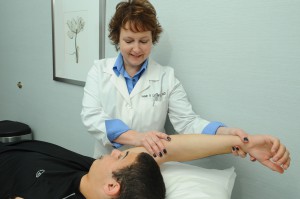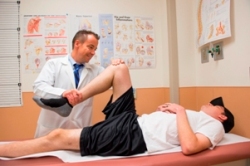According to the Bureau of Labor Statistics, tendonitis causes more than 70,000 people to miss work per year. This is just one of many reasons why it is important to understand the symptoms of tendonitis so that you can avoid not only the pain but the inconvenience it...
LATEST BLOGS
Husband and Wife of 54 Years Undergo Joint Replacement Surgeries On The Same Day
Premier Orthopaedics surgeon, Dr. Jonathan Garino, performed back-to-back procedures on a couple who have been married for 54 years! They shared their same-day surgery journey at the MUVE Center with @6ABC. Watch the incredible story below. Read the full ABC6 story...
What are Non-Surgical Treatment Options for a Herniated Disc
The spine consists of 26 bones called vertebrae and between them are cushion-like pads called “intervertebral discs”. The discs serve as shock absorbers for the vertebrae and help provide stability to the spine. When one of these intervertebral discs loses its normal...
5 Common Myths About Growing Pains

You’ve probably heard someone tell a child something along the lines of it’s just growing pains. Many people believe that throbbing pain in the legs or arms of an underdeveloped child can be attributed to the child growing. However, there’s no evidence that growth can be painful. As a child gets older, they’ll experience some pain due to other problems. Learn more about common myths people believe in regarding growing pains.
- Growing pain
s are real. While it’s possible that a child is experiencing pain, it’s not because he or she is growing. Growth doesn’t correspond with pain, with the exception of teething. If your child is complaining about pain, you should take them to a doctor for a physical because they’re dealing with an issue that probably has nothing to do with growing. - My child will eventually stop having growing pains. Some parents think their child will just grow out of their pain and it will stop. Since there isn’t scientific evidence that supports growing pains, a child complaining about pain is suffering from an actual problem. Ignoring the problem, whether it’s an injury or a disease, won’t make the issue go away. The child has to be evaluated by adoctor and given the appropriate treatment.
- My child plays sports, so it’s normal for him or her to experience pain.
It’s never normal for anyone to experience pain if there isn’t a more serious issue. In fact, it’s especially important that you address your child’s aches and pains if he or she is physically active or involved in sports because that means there’s a greater chance that your child is dealing with an injury.
It’s common for children to be injured while playing sports because they aren’t experts in the game and they often use improper techniques. The lack of knowledge regarding proper technique leads to young players injuring themselves and others. They’re also still growing and their bodies aren’t very strong, so broken bones and sprains can happen.
Pay close attention to your child athlete because injuries left untreated can lead to serious problems in the future.
- My child only complains every now and then. If your child complains sporadically, he or she could still be dealing with a serious injury. They may stop complaining if they have a high pain threshold and become used to the feeling or if the injury only hurts when being moved in a specific position. The bottom line is that if your child complains of pain at any point, you should have him or her examined by a physician.
Growing pains haven’t been proven, so if your child tells you that they’re suffering, don’t ignore them. Take them seriously and have them checked out by a doctor. Injuries that go untreated can cause diseases and limb problems down the line. Click here to set up a consultation with one of the qualified physicians at Premier Orthopaedics.
For more information about fracture care, click here to download our free eBook,Understanding Fracture Care: Causes, Diagnosis, and Treatment.



